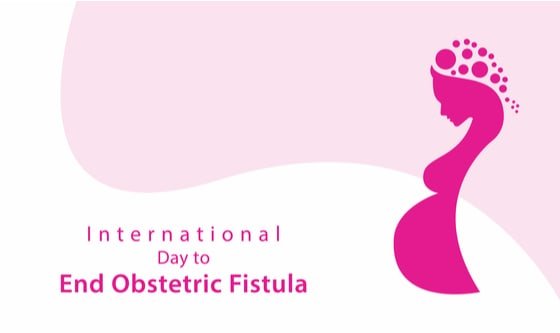
International Day to End Obstetric Fistula
Today is the International Day to End Obstetric Fistula.
When women are giving birth to their children, they get contractions, which continually push the baby towards the vagina for birth. But if the labour is prolonged, without any medical assistance, the contractions push the baby’s head against the mother’s pelvis. The soft tissue caught between the mother’s pelvis and the baby’s head, due to constant compression from the labour, restricts blood flow.
If the labour goes on for hours into days with those constant contractions, the soft tissue without blood flow dies and leaves a hole called a ‘fistulae’ – normally between the mother’s vagina and bladder or rectum. If this hole is not treated through surgery, urine and stool leak out of the woman’s vagina for the rest of her life. This is what is called Obstetric Fistula.
Prolonged labour in itself is not healthy for babies. It causes low oxygen and abnormal heart rhythm in the babies which can kill them. This is an awful experience for any mother to go through, especially after risking her health in the process of childbearing. Fistulas also cause more damage beyond leakage. Some women’s lower limbs are damaged, resulting in a condition known as ‘foot drop’ which makes walking extremely painful and difficult.
For many women, living with this condition paralyses them; they experience social stigma and isolation. And for many who may need to work to provide for their families are rendered incapable of doing so, this at times leads to depression and deepens the cycle of poverty.
According to the World Health Organisation, 50 – 100,000 women suffer from obstetric fistulas worldwide. But it is preventable; by delaying a woman’s first pregnancy, and getting timely obstetric care, this can all be prevented.
23 May, each year, is the International Day to End Obstetric Fistula. It is an annual reminder to champion for the reproductive rights of women around the world. This ensures all women get access to professional maternal care irrespective of location, and end fistula completely.
This year the theme is ‘End gender inequality! End health inequities! End Fistula now!’ It is a rallying call to ensure more women, and especially young girls married off early, have access to maternal care.
The United Nations Population Fund (UNFPA) estimates that due to the COVID-19 pandemic, 13 million more child marriages could take place by 2030 worldwide. With more women marrying young with bodies too underdeveloped to carry pregnancies, and a lack of access to obstetric care, there is a likelihood that even more women will experience obstetric fistula. These harmful traditional practices of early child marriage need to be stopped to avoid jeopardizing the health of young girls around the world.
So what can you do to reduce obstetric fistula?
The first thing to do is to first understand what fistula is; when you are informed you can inform others. Secondly, report any harmful traditional practices such as early child marriage to authorities to avoid girls being placed in this harmful position. Thirdly, if there is a woman you know in need of maternal care even before her due date, not seeking assistance from a medical professional, you need to encourage her or even take her to one to ensure any complications are detected early.
Fourth, if there is someone you know who may be suffering in silence from obstetric fistula, contact AMREF Health Africa which offers free surgical camps periodically.
Do you think we can come together to stop obstetric fistula?
